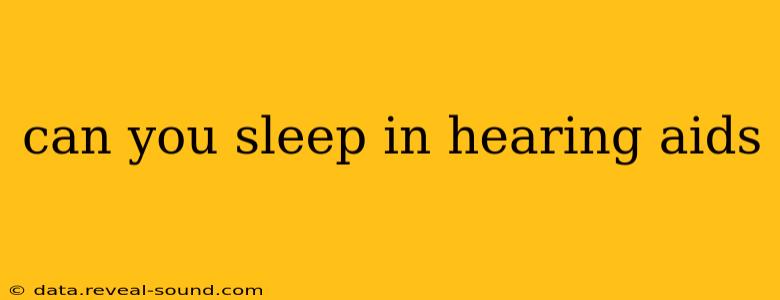Can You Sleep in Hearing Aids? A Comprehensive Guide
The question of whether or not you can sleep in hearing aids is a common one, and the answer isn't a simple yes or no. It depends on several factors, including the type of hearing aid you have, your personal comfort level, and potential risks. Let's delve into the details.
What Happens If You Sleep With Hearing Aids In?
Sleeping with hearing aids in can potentially lead to several problems, making it generally not recommended. The risks include:
- Damage to the hearing aid: Movement during sleep can cause the hearing aid to be damaged, scratched, or even broken. This is especially true for more delicate models. Sweat and oils from your skin can also accumulate, leading to malfunctions.
- Discomfort and skin irritation: Constantly wearing hearing aids, even while sleeping, can lead to discomfort and irritation of the skin in your ear canal. This can cause pain, redness, and potentially infection.
- Loss or damage of the hearing aid: You could accidentally roll over onto your hearing aids, causing them to become lost or damaged.
- Earwax buildup: Sleeping with hearing aids in can exacerbate earwax buildup, potentially impacting hearing aid function and ear health.
What Types of Hearing Aids Are Less Suitable for Sleeping In?
Certain hearing aid types are particularly vulnerable to damage when worn during sleep:
- Behind-the-ear (BTE) hearing aids: These are more prone to damage from impact during sleep due to their size and position.
- Receiver-in-canal (RIC) hearing aids: While smaller than BTEs, they still carry a risk of damage from movement or pressure during sleep.
- In-the-canal (ITC) and completely-in-canal (CIC) hearing aids: These are more prone to becoming lost during sleep.
Essentially, any hearing aid is at risk when worn overnight.
Are There Any Circumstances Where Sleeping With Hearing Aids Might Be Considered?
There are extremely rare exceptions where a hearing professional might suggest briefly wearing aids during sleep, such as for specific therapeutic purposes related to tinnitus management. However, this is not a common recommendation and would require careful consideration of risks and benefits. Never attempt this without explicit instruction from your audiologist.
What Are the Best Practices for Hearing Aid Care?
Proper hearing aid care is crucial for their longevity and your hearing health. Here's what to do:
- Remove your hearing aids before sleeping: This is the most crucial step to protect your hearing aids and your ears.
- Clean your hearing aids daily: Use the cleaning tools provided by your audiologist to remove wax and debris.
- Store your hearing aids in a safe, dry place: A hearing aid case is ideal to prevent damage and loss.
- Follow your audiologist's instructions carefully: Your audiologist can provide personalized advice on cleaning and care.
How Can I Protect My Hearing While I Sleep?
If you're concerned about noise disrupting your sleep, consider using earplugs designed for sleeping. These provide sound dampening without the risks associated with sleeping in hearing aids.
In conclusion, while there might be rare exceptions, it's generally not recommended to sleep in your hearing aids. The potential risks of damage, discomfort, and infection outweigh any perceived benefits. Prioritizing proper care and storage will ensure your hearing aids remain functional and serve you well for years to come. Always consult your audiologist for personalized advice on hearing aid care and any concerns about your hearing health.
